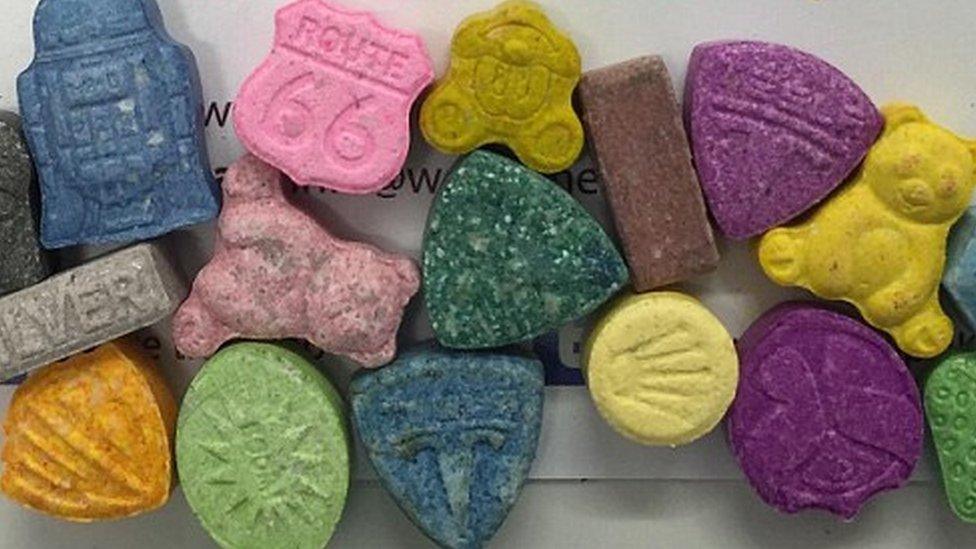MDMA: Why it's 'impossible' to know how the drug affects you
- Published

It's impossible to predict how MDMA affects users even with on-site testing at festivals, researchers are warning.
More than 650 seized ecstasy tablets were tested in a study by Queen Mary University and experts at St George's University in London.
It found that levels of MDMA, the active drug in ecstasy, varied by more than 250% in the same batch.
Scientists also found a huge difference in how long it took the tablets to release MDMA into the body.
They claim it's the first time ecstasy tablets have been found to disintegrate at different rates.
"Fast releasing" tablets released 95% of their MDMA within 30 minutes, according to the study, with slower ones taking 100 minutes - which they warn increases the likelihood of someone taking a second dose before the effects of the first are fully experienced.

Ecstasy, or MDMA, has become readily available to buy, particularly on the "dark web"
Drug analyst Trevor Shine says his team were "surprised" at the "huge" difference in MDMA levels between pills, as well as the difference in disintegration rates.
He says this study shows that MDMA affects people differently, and that it's impossible to predict what varying amounts will do.
The team say the "vast majority of people using MDMA do not come to harm, but there is at present no way to predict, determine or prevent who will."
"I suspect many/most users will still view it as something that happens to others, not them," Trevor tells Radio 1 Newsbeat.
Drugs in the Post: An investigation
Experts say there's been a "resurgence in use of MDMA in Europe" as well as an increase in strength.
"Our research clearly demonstrates that taking MDMA is a far more risky activity than perhaps thought," says Dr Lewis Couchman from St George's.
"It is prone to unpredictable dosing with toxic effects and potentially lethal consequences, of which users and drug workers need to be aware and should be warned."
What happens in your body when you take MDMA?
"When MDMA gets absorbed into your blood stream, it hits your brain and causes it to release a whole bunch of chemicals," addiction psychiatrist Dr Adam Winstock, who also runs the Global Drug Survey, previously told Newsbeat.
"Mainly serotonin but also things called noradrenalin and dopamine. This is what gives you the pleasurable effects.
"But if you take too much these same chemicals can cause your heart to start going too fast, and you can start overheating, sweating and gurning.
"And the euphoria and energy give way, so you're left feeling anxious, twitchy and agitated."
Because it's a class A drug, possession of MDMA can land you with up to seven years in prison.
If you need help with anything raised in this article, you can find advice here.


Follow Newsbeat on Instagram, external, Facebook, external, Twitter, external and YouTube, external.
Listen to Newsbeat live at 12:45 and 17:45 weekdays - or listen back here.
- Published29 June 2018

- Published12 November 2018

- Published2 April 2019
